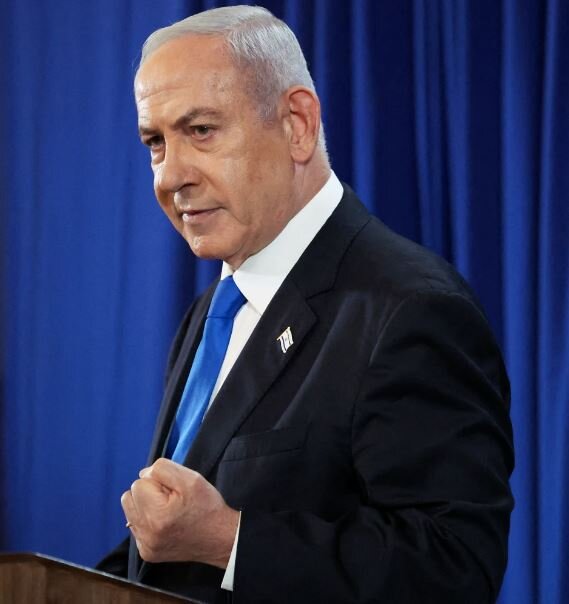Why Netanyahu’s desperation for war with Iran could backfire
TEHRAN – Since October 7th, the Israel-Iran conflict has been teetering on the edge of escalation. Israeli Prime Minister Benjamin Netanyahu’s strategy seems increasingly desperate, as he pushes the region toward what could become a full-scale conflagration in West Asia. The consequences of such a conflict could not only harm Israel’s security, but also


TEHRAN – Since October 7th, the Israel-Iran conflict has been teetering on the edge of escalation. Israeli Prime Minister Benjamin Netanyahu’s strategy seems increasingly desperate, as he pushes the region toward what could become a full-scale conflagration in West Asia.
The consequences of such a conflict could not only harm Israel’s security, but also ripple across the globe, affecting energy markets, global security, and the very fabric of the international order.
At the core of Netanyahu’s actions lies a strategy rooted in power politics. Israel has long felt existentially threatened by Iran’s growing influence across West Asia, particularly through its allied groups in Lebanon, Syria, and Gaza. In response, Israel has adopted a doctrine of preventive war. Netanyahu’s goal is clear: neutralize threats before they fully materialize.
However, as Professor John Mearsheimer has extensively argued, the decapitation strategy—targeting the leadership of organizations like Hezbollah and Hamas—has consistently proven ineffective. Historical precedent shows that eliminating leaders rarely results in the collapse of movements. More often than not, new leaders emerge, sometimes more capable than their predecessors. Israel’s airstrikes and targeted assassinations, while temporarily weakening its enemies, do little to address the deeper structural issues at play.
Nowhere is this clearer than in Israel’s ongoing conflict with Hezbollah in Lebanon. Since the 2006 war, Hezbollah has evolved from a guerrilla force into a highly sophisticated military organization. With Iranian support, Hezbollah has built an extensive military infrastructure, including precision-guided missiles, anti-tank weapons, and underground bunkers in southern Lebanon. A full Israeli ground invasion into Lebanon, should it occur, would be perilous—facing a better-armed and better-prepared adversary than during the 2006 conflict.
Adding to this complexity, Hezbollah’s close ties with the Islamic Revolution Guard Corps (IRGC) introduce a layer of asymmetric warfare, which could extend the conflict beyond the occupied territories and involve other Resistance groups in the region. The risk of entangling other nations in the conflict remains ever-present.
Netanyahu’s domestic political calculations
Israel’s military challenges pale in comparison to Netanyahu’s political motives. Beset by corruption charges and growing public discontent over judicial reforms, Netanyahu is under immense domestic pressure. By amplifying the Iranian threat, Netanyahu can consolidate his political base, distracting from Israel’s internal strife and offering a rallying point for unity. In this sense, his personal political survival is tied to the perpetuation of conflict, even if it does not align with Israel’s long-term strategic interests.
This creates a dangerous paradox: while Israel might benefit from a more measured diplomatic approach to regional conflicts, Netanyahu’s political ambitions seem to demand continued escalation. The consequences for Israel’s international standing, and indeed for the wider region, are profound.
Global energy implications of an Iran-Israel war
The implications of a potential all-out war between Iran and Israel stretch far beyond West Asia. Any escalation could disrupt global energy markets, sending shockwaves through the global economy. West Asia remains the heart of the world’s energy supply chain, and the Strait of Hormuz—through which a third of the world’s liquefied natural gas and 20% of its oil passes—becomes a flashpoint in this conflict.
Iran has previously threatened to blockade the strait in retaliation for Israeli and U.S. actions. Such a move would cause oil prices to skyrocket, potentially triggering a global recession akin to the 1973 OPEC crisis. Energy-dependent regions like Europe and China would be hit hardest, with Europe already grappling with energy shortages exacerbated by the war in Ukraine. A further spike in energy prices could lead to economic paralysis in Europe and severe disruptions to global supply chains.
China, the world’s largest importer of oil, would face an acute economic crisis if the conflict expanded. With supply chains tightening and inflation already high, the global economic fallout would be immense, potentially causing cascading effects on global financial stability.
U.S. strategic distraction
From a U.S. perspective, Netanyahu’s actions are particularly problematic. For the past decade, Washington has sought to pivot away from West Asia and toward the Indo-Pacific, where the South China Sea and competition with China are seen by Americans as the defining strategic challenges of the 21st century.
However, Israel’s ongoing conflicts—and the prospect of a full-scale war with Iran—are pulling U.S. resources back into the West Asian quagmire. While the U.S. initially sought to reduce its military commitments in the region, the endless cycle of violence involving Israel keeps dragging American foreign policy back into West Asia. This prevents the U.S. from focusing on its long-term strategic goal: countering China’s rise in the Indo-Pacific.
Economic and demographic costs for Israel
The financial cost of Israel’s war is already staggering. Estimates suggest the current conflict could cost Israel over $70 billion, driving a significant economic deficit. But perhaps the more critical threat to Israel’s future lies in its demographic trends.
Unlike Iran, which has weathered decades of sanctions and economic hardship without significant demographic decline, Israel faces the risk of a population outflow. Many Israelis hold dual citizenship, particularly in Europe and North America, and are increasingly opting to leave the region amid rising insecurity. This exodus poses a long-term threat to Israel’s sustainability as a “nation-state”, weakening both its economy and its military preparedness.
The nuclear dilemma
As Israel continues to escalate the conflict, it may inadvertently push Iran toward reconsidering its nuclear strategy. Thus far, Iran has avoided nuclear armament. However, sustained Israeli provocations could lead Tehran to accelerate its nuclear ambitions, potentially sparking a nuclear arms race in the region. This scenario would be catastrophic for global security, and particularly for Israel’s long-term safety.
Netanyahu’s apparent desperation to draw Iran into an open war is a dangerous gamble. While it may serve his short-term political interests, the long-term costs—for Israel, for the U.S., and for the global order—are enormous. The risks to energy security, U.S. strategic interests, and Israel’s very future cannot be overstated. As this conflict escalates, the question remains: Can this crisis be contained, or are we witnessing the beginning of a much larger geopolitical catastrophe?
